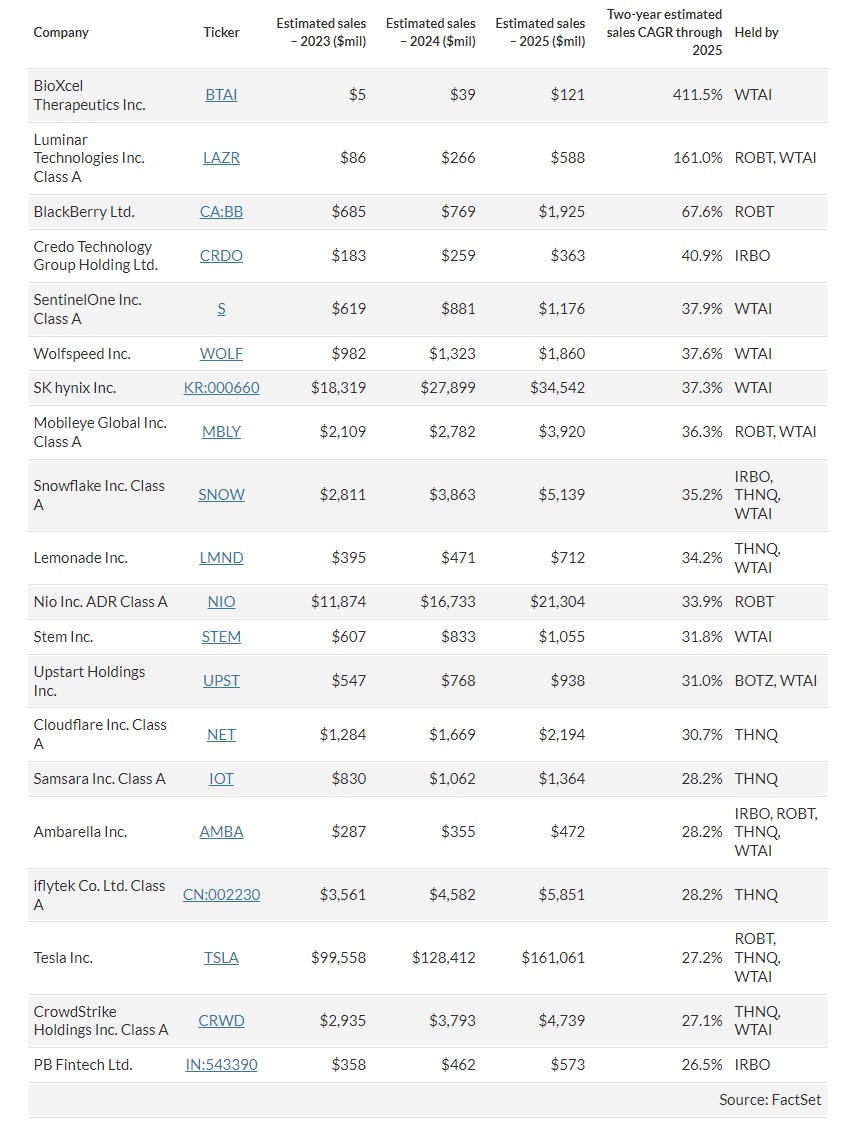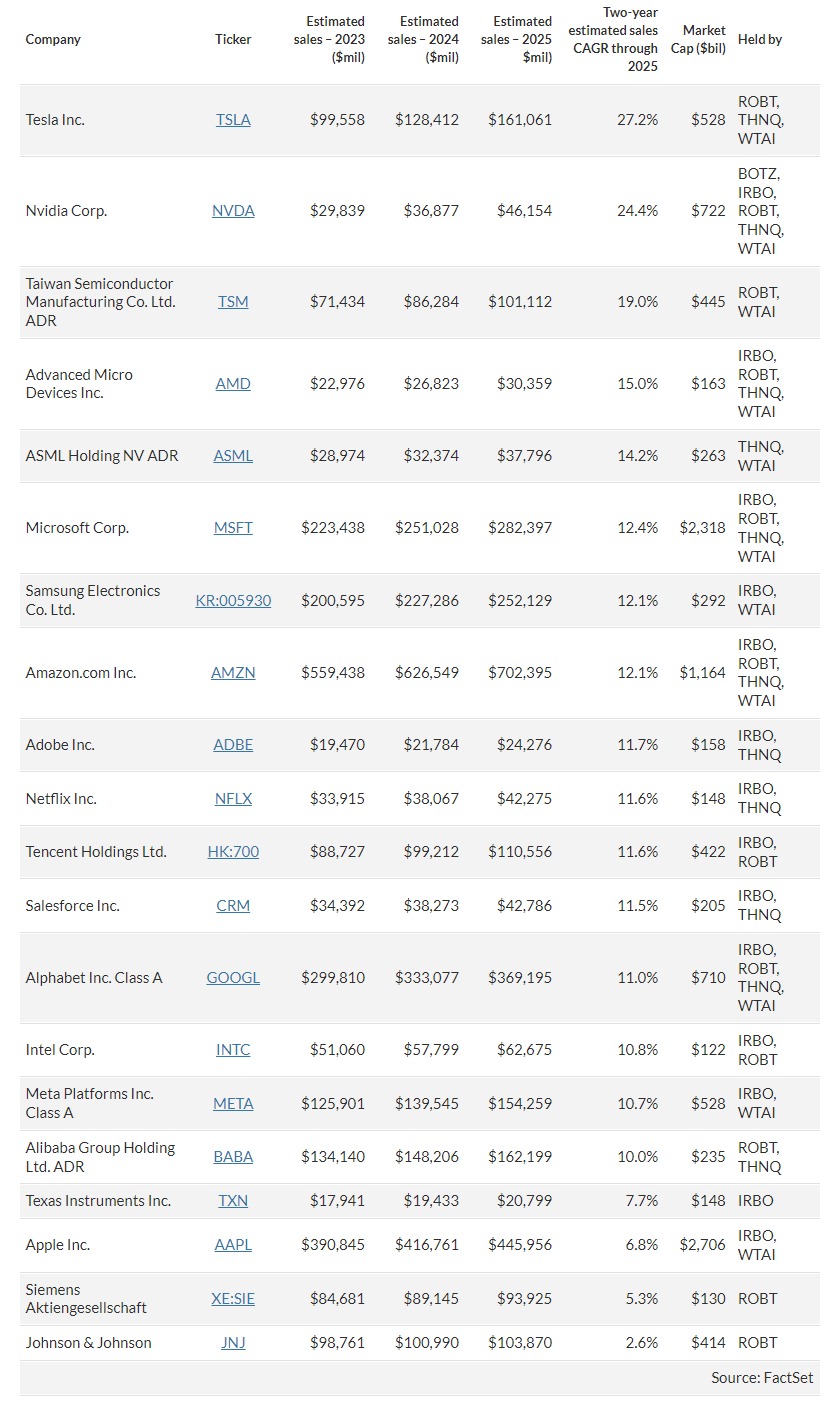AI is "the next new thing" in tech, but unlike other investment fads, this one seems likely to have staying power as it transforms many industries
Things move quickly in the world of artificial intelligence. It is easy to sit back and complain about developments that could be disruptive, but sometimes investors are best served by putting emotions aside and observing new developments and how they affect markets. Could AI developments and related trends make you a lot of money?
Below is a new screen showing a group of AI-oriented companies expected to increase their sales most rapidly through 2025, based on consensus estimates among analysts polled by FactSet. Then we show expected revenue growth rates for the largest AI-oriented companies in the screen.
Over the long haul, many businesses might perform more efficiently by employing AI. Maybe this technology can create an economic revolution similar to the one that moved the majority of the working population away from agricultural labor during the 19th and 20th centuries.
Back in February, we screened 96 stocks held by five exchange-traded funds focused on AI and related industries and listed the 20 that analysts thought would rise the most over the following 12 months.
Three months is a long time for AI, and the shakeout hasn't even started.
Read:Congress and tech seem open to regulating AI efforts, but that doesn't mean it will happen
There is no way to predict how politicians will react to perceived or real threats of AI and machine learning. And the largest U.S. tech players are doing everything they can to employ the new technology and remain dominant. But that doesn't mean they will grow more quickly than smaller AI-focused players.
A new AI stock screen
Once again we will begin a screen with these five ETFs:
The Global X Robotics & Artificial Intelligence ETF BOTZ BOTZ was established 2016 and has $1.8 billion in assets under management. The fund tracks an index of companies listed in developed markets that are expected to benefit from the increased utilization of robotics and AI. There are 44 stocks in the BOTZ portfolio, which is weighted by market capitalization and rebalanced once a year. Its largest holding is Intuitive Surgical Inc. ISRG, which makes up 10% of the portfolio, followed by Nvidia Corp. NVDA at 9.4%.
The iShares Robotics and Artificial Intelligence Multisector ETF IRBO holds 116 stocks that are equal-weighted, as it tracks a global index of companies that derive at east 50% of revenue from robotics or AI, or have significant exposure to related industries. This ETF was launched in 2018 and has $304 million in assets.
The $246 million First Trust Nasdaq Artificial Intelligence & Robotics ETF ROBT has 107 stocks in its portfolio, with a modified weighting based on how directly companies are involved in AI or robotics. It was established in 2018.
The Robo Global Artificial Intelligence ETF THNQ has $26 million in assets and was established in 2020. I holds 69 stocks and isn’t concentrated. It uses a scoring system to weight its holdings by percentage of revenue derived from AI, with holdings also subject to minimum market capitalization and liquidity requirements.
The newest ETF on this list is the WisdomTree Artificial Intelligence and Innovation Fund WTAI, which was established in December and has $13 million in assets and holds 73 stocks in an equal-weighted portfolio. According to FactSet, stocks are handpicked and selected companies “generate at least 50% of their revenue from AI and innovation activities, including those related to software, semiconductors, hardware technology, machine learning and innovative products.”
Altogether and removing duplicates, the five ETFs hold 270 stocks of companies in 23 countries. We first narrowed the list to 197 covered by at least nine analysts and for which consensus sales estimates are available through calendar 2025. We used calendar-year estimates because some companies have fiscal years that don't match the calendar.
Here are the 20 screened AI-related companies expected by analysts to have the highest compound annual growth rates (CAGR) for sales from 2023 through 2025. Sales estimates are in millions of U.S. dollars. The list also shows which of the above five ETFs holds each stocks.
We have screened for expected revenue growth, rather than for earnings or cash flow, because in a newer tech-oriented business area, investors are most likely to consider the top line as companies sacrifice profits to build market share.
It is important to do your own research if you consider purchasing any individual stock, to form your own opinion about a company's ability to remain competitive over the long term. Starting from the top of the list, BioXcel Therapeutics Inc. $(BTAI)$ is expected to show exponential sales growth, but that is from a low expected baseline this year.
What about the largest AI-related companies held by these ETFs?
Here are the largest 20 companies in the screen by market capitalization, ranked by expected sales CAGR from 2022 through 2025. Once again the sales estimates are in millions of U.S. dollars, but the market caps are in billions.


